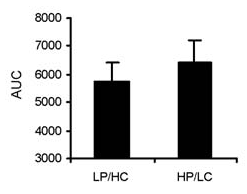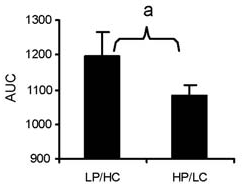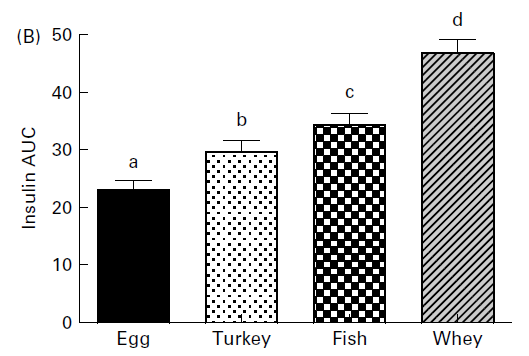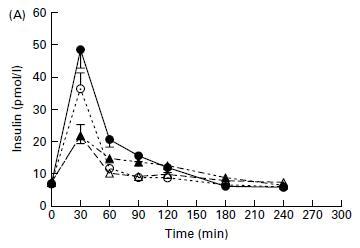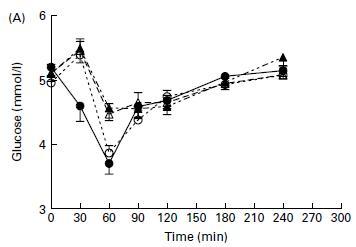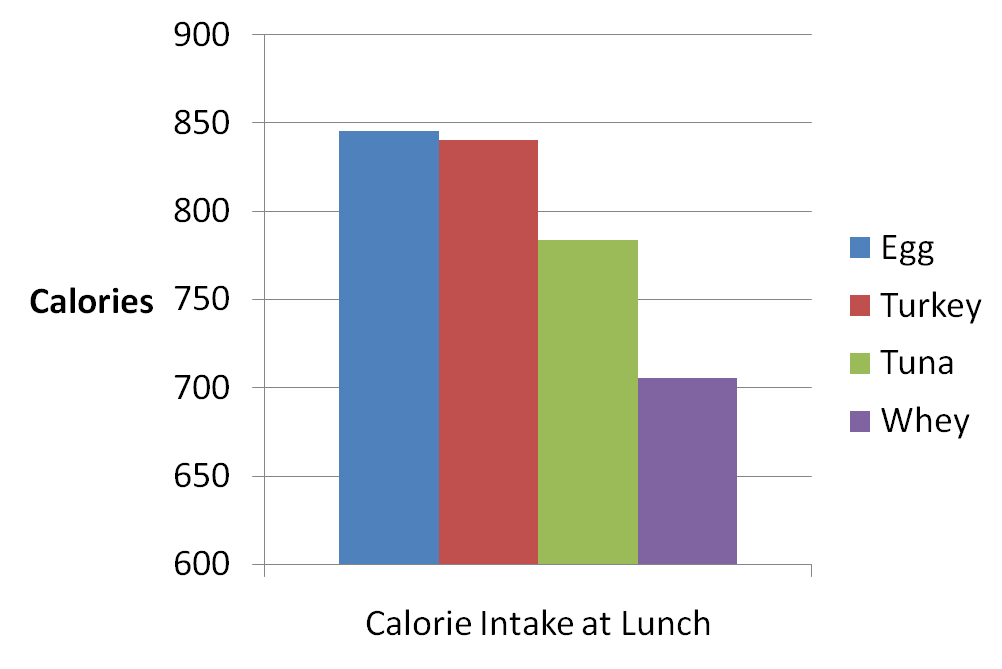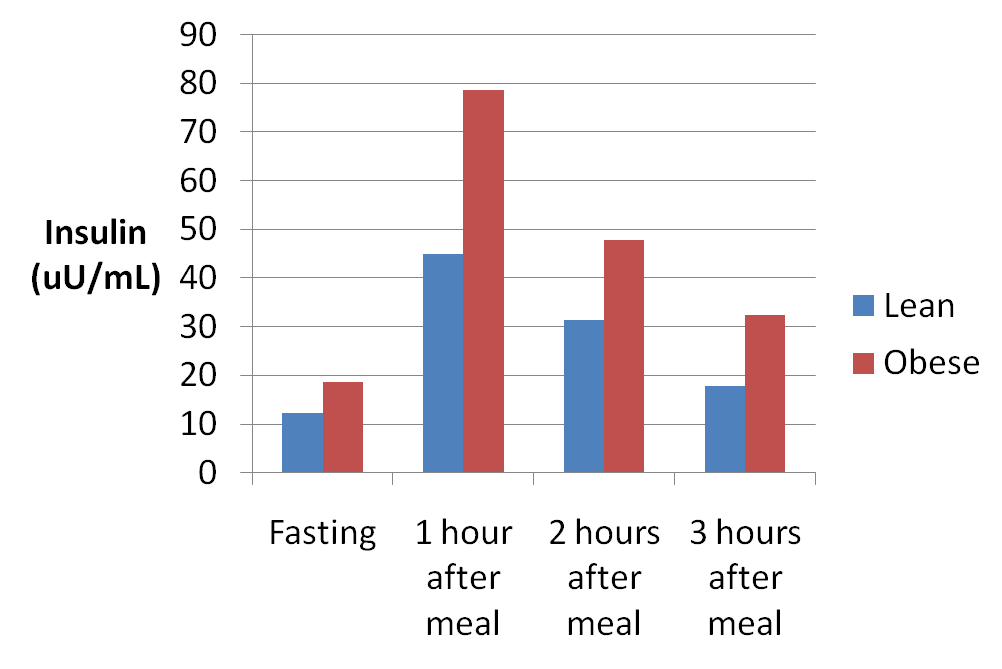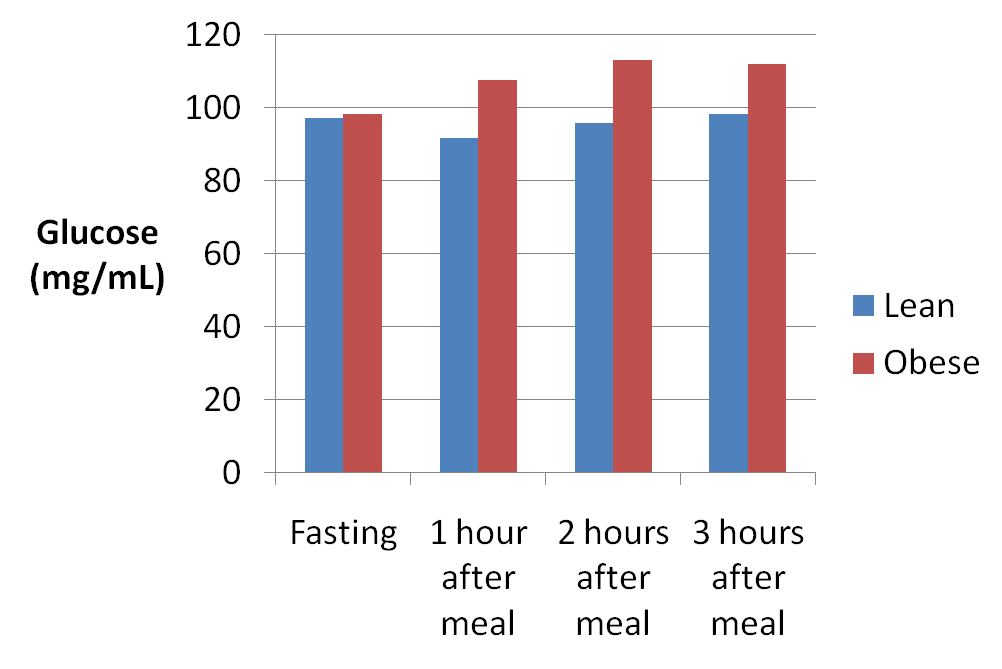I feel sorry for insulin. Insulin has been
bullied and beaten up. It has been cast as an evil hormone that should
be shunned. However, insulin doesn't deserve the treatment it has
received.
Insulin: A Primerbullied and beaten up. It has been cast as an evil hormone that should
be shunned. However, insulin doesn't deserve the treatment it has
received.
Insulin is a hormone that regulates the levels of sugar in your
blood. When you eat a meal, the carbohydrate in the meal is broken down
into glucose (a sugar used as energy by your cells). The glucose
enters your blood. Your pancreas senses the rising glucose and releases
insulin. Insulin allows the glucose to enter your liver, muscle, and
fat cells. Once your blood glucose starts to come back down, insulin
levels come back down too. This cycle happens throughout the day. You
eat a meal, glucose goes up, insulin goes up, glucose goes down, and
insulin goes down. Insulin levels are typically lowest in the early
morning since it's usually been at least 8 hours after your last meal.
Insulin doesn't just regulate blood sugar. It has other effects as well. For example, it stimulates your muscles to build new protein (a process called protein synthesis). It also inhibits lipolysis (the breakdown of fat) and stimulates lipogenesis (the creation of fat).
It is the latter effect by which insulin has gotten its bad
reputation. Because carbohydrate stimulates your body to release
insulin, it has caused some people to argue that a diet high in
carbohydrate will cause you to gain fat. Their reasoning, in a
nutshell, goes like this:
High Carbohydrate Diet -> High Insulin -> Increased
Lipogenesis/Decreased Lipolysis -> Increased Body Fat -> Obesity
Using this same logic, they argue that a low carbohydrate diet is
best for fat loss, because insulin levels are kept low. Their logic
chain goes something like this:
Low Carbohydrate Diet -> Low Insulin -> Decreased Lipogenesis/Increased Lipolysis -> Decreased Body Fat
However, this logic is based on many myths. Let's look at many of the myths surrounding insulin.
MYTH:A High Carbohydrate Diet Leads to Chronically High Insulin Levels
FACT:Insulin Is Only Elevated During the Time After a Meal In Healthy Individuals
One misconception regarding a high carbohydrate intake is that it
will lead to chronically high insulin levels, meaning you will gain fat
because lipogenesis will constantly exceed lipolysis (remember that fat
gain can only occur if the rate of lipogenesis exceeds the rate of
lipolysis). However, in healthy people, insulin only goes up in
response to meals. This means that lipogenesis will only exceed
lipolysis during the hours after a meal (known as the postprandial period).
During times when you are fasting (such as extended times between
meals, or when you are asleep), lipolysis will exceed lipogenesis
(meaning you are burning fat). Over a 24-hour period, it will all
balance out (assuming your are not consuming more calories than you are
expending), meaning you do not gain weight. Here's a graph showing how
this works:
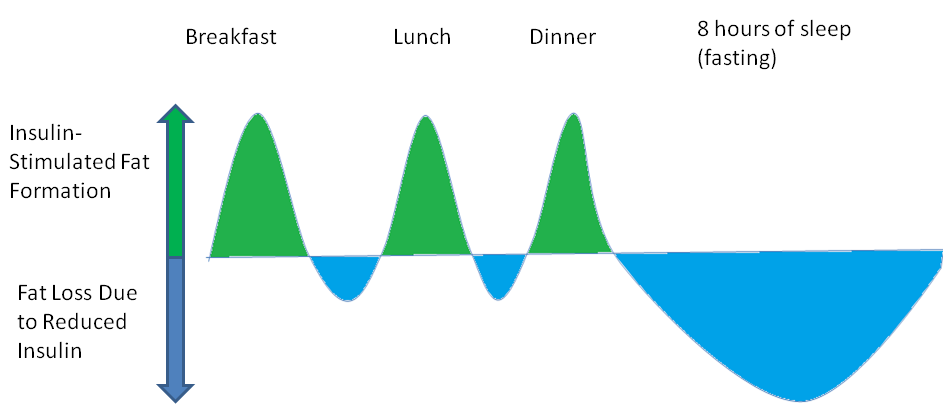
After
meals, fat is deposited with the help of insulin. However, between
meals and during sleep, fat is lost. Fat balance will be zero over a
24-hour period if energy intake matches energy expenditure.
meals, fat is deposited with the help of insulin. However, between
meals and during sleep, fat is lost. Fat balance will be zero over a
24-hour period if energy intake matches energy expenditure.
the lipogenesis occuring in response to a meal. The blue area
represents lipolysis occuring in response to fasting between meals and
during sleep. Over a 24-hour period, these will be balanced assuming
you are not consuming more calories than you expend. This is true even
if carbohydrate intake is high. In fact, there are populations that
consume high carbohydrate diets and do not have high obesity rates, such
as the traditional diet of the Okinawans. Also, if energy intake is lower than energy expenditure, a high carbohydrate diet will result in weight loss just as any other diet.
MYTH: Carbohydrate Drives Insulin, Which Drives Fat Storage
FACT: Your Body Can Synthesize and Store Fat Even When Insulin Is Low
One of the biggest misconceptions regarding insulin is that it's
needed for fat storage. It isn't. Your body has ways to store and
retain fat even when insulin is low. For example, there is an enzyme in
your fat cells called hormone-sensitive lipase (HSL). HSL helps break
down fat. Insulin suppresses the activity of HSL, and thus suppresses
the breakdown of fat. This has caused people to point fingers at
carbohydrate for causing fat gain.
However, fat will also suppress HSL even when insulin levels are low.
This means you will be unable to lose fat even when carbohydrate intake
is low, if you are overeating on calories. If you ate no carbohydrate
but 5,000 calories of fat, you would still be unable to lose fat even
though insulin would not be elevated. This would be because the high
fat intake would suppress HSL. This also means that, if you're on a low
carbohydrate diet, you still need to eat less calories than you expend
to lose weight.
Now, some people might say, "Just try and consume 5000 calories of
olive oil and see how far you get." Well, 5000 calories of olive oil
isn't very palatable so of course I won't get very far. I wouldn't get
very far consuming 5,000 calories of pure table sugar either.
MYTH: Insulin Makes You Hungry
FACT: Insulin Suppresses Appetite
It is a well known fact that insulin acutely suppresses appetite. This has been demonstrated in dozens and dozens of experiments. This will be important when we talk about the next misconception...
MYTH: Carbohydrate Is Singularly Responsible for Driving Insulin
FACT: Protein Is a Potent Stimulator of Insulin Too
This is probably the biggest misconception that is out there.
Carbohydrates get a bad rap because of their effect on insulin, but
protein stimulates insulin secretion as well. In fact, it can be just
as potent of a stimulus for insulin as carbohydrate. One recent study compared the effects of two different meals on insulin.
One meal contained 21 grams of protein and 125 grams of carbohydrate.
The other meal contained 75 grams of protein and 75 grams of
carbohydrate. Both meals contained 675 calories. Here is a chart of
the insulin response:
Now here's a chart of the blood sugar response:
You can see that, despite the fact that the blood sugar response was
much higher in the meal with more carbohydrate, the insulin response
wasn't higher. In fact, the insulin response was somewhat higher after
the high protein meal, although this wasn't statistically significant.
Some people might argue that the "low-carb" condition wasn't really
low carb because it had 75 grams of carbohydrate. But that's not the
point. The point is that the high-carb condition had nearly TWICE as
much carbohydrate, along with a HIGHER glucose response, yet insulin
secretion was slightly LOWER. The protein was just as powerful at
stimulating insulin as the carbohydrate.
I can also hear arguments coming like, "Yeah, but the insulin
response is longer and more drawn out with protein." That wasn't true
in this study either.
You can see in the chart that there was a trend for insulin to peak
faster with the high protein condition, with a mean response of 45 uU/mL
at 20 minutes after the meal, versus around 30 uU/mL in the high carb
condition.
This tendency for a higher insulin response was associated with a
tendency towards more appetite suppression. The subjects had a tendency
towards less hunger and more fullness after the high protein meal:

Comparison of low protein, high carb and high protein, low carb meals and their effects on hunger and fullness
that compared the effects of 4 different types of protein on the
insulin response to a meal. This study was interesting because they
made milkshakes out of the different proteins (tuna shakes????
YUCK!!!!! Of course some people may remember the tuna shake recipes
from the misc.fitness.weights
days). The shakes contained only 11 grams of carbohydrate, and 51
grams of protein. Here's the insulin response to the different shakes:
You can see that all of these proteins produced an insulin response,
despite the fact that the carbohydrate in the shake was low. There was
also different insulin responses between the proteins, with whey
producing the highest insulin response.
Now, some might argue that the response is due to gluconeogenesis
(a process by which your liver converts protein to glucose). The
thought is that the protein will be converted to glucose, which will
then raise insulin levels. As I mentioned earlier, people will claim
that this will result in a much slower, more drawn-out insulin response,
since it takes time for your liver to turn protein into glucose.
However, that's not the case, because the insulin response was rapid,
peaking within 30 minutes and coming back down quickly at 60 minutes:
This rapid insulin response was not due to changes in blood glucose.
In fact, whey protein, which caused the greatest insulin response,
caused a drop in blood glucose:
The insulin response was associated with appetite suppression. In
fact, the whey protein, which had the highest insulin response, caused
the greatest suppression of appetite. Here's a chart showing the
calorie intake of the subjects when they ate lunch 4 hours after
drinking the shake:
The subjects ate nearly 150 calories less at lunch when they had whey
protein, which also caused the greatest insulin response. In fact,
there was an extremely strong inverse correlation between insulin and
food intake (a correlation of -0.93).
Here's data from another study
that looked at the insulin response to a meal that contained 485
calories, 102 grams of protein, 18 grams of carbohydrate, and almost no
fat:
You can see that the insulin response was exaggerated in the obese
subjects, probably due to insulin resistance. Here's a chart of the
blood glucose response. You can see there was no relationship between
the glucose response and insulin, which was similar to the study
discussed earlier.
The fact is that protein is a potent stimulator of insulin secretion,
and this insulin secretion is not related to changes in blood sugar or
gluconeogenesis from the protein. In fact, one study found beef to stimulate just as much insulin secretion as brown rice.
The blood sugar response of 38 different foods could only explain 23%
of the variability in insulin secretion in this study. Thus, there's a
lot more that's behind insulin secretion than just carbohydrate.
So how can protein cause rapid rises in insulin, as shown in the whey
protein study earlier? Amino acids (the building blocks of protein)
can directly stimulate your pancreas to produce insulin, without having to be converted to glucose first. For example, the amino acid leucine directly stimulates pancreas cells to produce insulin, and there's a direct dose-response relationship (i.e., the more leucine, the more insulin is produced).
Some might say, "Well, sure, protein causes insulin secretion, but
this won't suppress fat-burning because it also causes glucagon
secretion, which counteracts insulin's effects." I mentioned earlier
how insulin will suppress lipolysis. Well, some people think that
glucagon increases lipolysis to cancel this out.
The thought that glucagon increases lipolysis is based on 3 things: the fact that human fat tissue has glucagon receptors, the fact that glucagon increases lipolysis in animals, and the fact that glucagon has been shown to increase lipolysis in human fat cells in vitro (in a cell culture). However, what happens in vitro isn't necessarily what happens in vivo (in your body). We have a case here where newer data has overturned old thinking. Research using modern techniques has shown that glucagon does not increase lipolysis in humans. Other research using the same techniques has shown similar results. I will also note that this research failed to find any lipolytic effect in vitro.
It should be remembered why glucagon is released in response to
protein in the first place. Since protein stimulates insulin secretion,
it would cause a rapid drop in blood glucose if no carbohydrate is
consumed with the protein. Glucagon prevents this rapid drop in blood
sugar by stimulating the liver to produce glucose.
Insulin: Not Such a Villain After All
The fact is that insulin is not this terrible, fat-producing hormone
that must be kept as low as possible. It is an important hormone for
appetite and blood sugar regulation. In fact, if you truly wanted to
keep insulin as low as possible, then you wouldn't eat a high protein
diet...you would eat a low protein, low carbohydrate, high fat diet.
However, I don't see anybody recommending that.
I'm sure some are having some cognitive dissonance reading this
article right now. I know because I experienced the same disbelief
years ago when I first discovered this paper
and how protein caused large insulin responses. At the time, I had the
same belief that others have...that insulin had to be kept under
control and as low as possible, and that spikes in insulin were a bad
thing. I had difficulty reconciling that study and my beliefs regarding
insulin. However, as time went on, and as I read more research, I
learned that my beliefs regarding insulin were simply wrong.
Now, you may be wondering why refined carbohydrates can be a
problem. Many people think it's due to the rapid spikes in insulin.
However, it's obviously not the insulin, because protein can cause rapid
spikes in insulin as well. One problem with refined carbohydrate is a
problem of energy density. With refined carbohydrate, it is easier to
pack a lot of calories into a small package. Not only that, but foods
with high energy density are often not as satiating as foods with low
energy density. In fact, when it comes to high-carbohydrate foods, energy density is a strong predictor of a food's ability to create satiety (i.e.,
low-energy density foods create more satiety). There are other issues
with refined carbohydrate as well that are beyond the scope of this
article.
The bottom line is that insulin doesn't deserve the bad reputation
it's been given. It's one of the main reasons why protein helps reduce
hunger. You will get insulin spikes even on a low-carb, high-protein
diet. Rather than worrying about insulin, you should worry about
whatever diet works the best for you in regards to satiety and
sustainability. As mentioned in last week's issue of Weightology Weekly,
individual responses to particular diets are highly variable and what
works for one person will not necessarily work for another. I will be
writing a post in the future on the need for individualized approaches
to nutrition.
Click here to read part 2 of this series on insulin.
